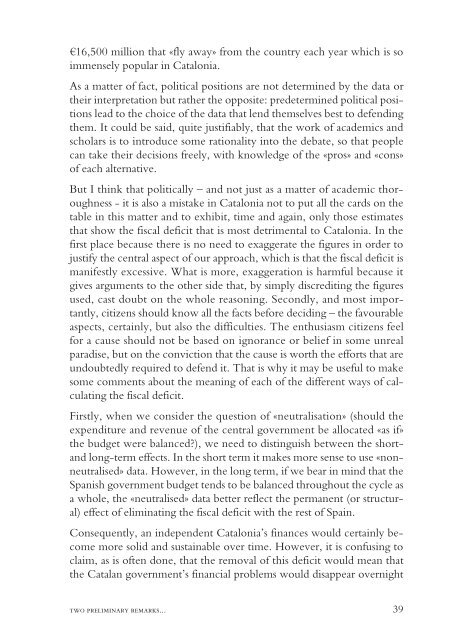The Economy of Catalonia
the_economy_of_catalonia._questions_and_answers_on_the_economic_impact_of_independence
the_economy_of_catalonia._questions_and_answers_on_the_economic_impact_of_independence
You also want an ePaper? Increase the reach of your titles
YUMPU automatically turns print PDFs into web optimized ePapers that Google loves.
€16,500 million that «fly away» from the country each year which is so<br />
immensely popular in <strong>Catalonia</strong>.<br />
As a matter <strong>of</strong> fact, political positions are not determined by the data or<br />
their interpretation but rather the opposite: predetermined political positions<br />
lead to the choice <strong>of</strong> the data that lend themselves best to defending<br />
them. It could be said, quite justifiably, that the work <strong>of</strong> academics and<br />
scholars is to introduce some rationality into the debate, so that people<br />
can take their decisions freely, with knowledge <strong>of</strong> the «pros» and «cons»<br />
<strong>of</strong> each alternative.<br />
But I think that politically – and not just as a matter <strong>of</strong> academic thoroughness<br />
- it is also a mistake in <strong>Catalonia</strong> not to put all the cards on the<br />
table in this matter and to exhibit, time and again, only those estimates<br />
that show the fiscal deficit that is most detrimental to <strong>Catalonia</strong>. In the<br />
first place because there is no need to exaggerate the figures in order to<br />
justify the central aspect <strong>of</strong> our approach, which is that the fiscal deficit is<br />
manifestly excessive. What is more, exaggeration is harmful because it<br />
gives arguments to the other side that, by simply discrediting the figures<br />
used, cast doubt on the whole reasoning. Secondly, and most importantly,<br />
citizens should know all the facts before deciding – the favourable<br />
aspects, certainly, but also the difficulties. <strong>The</strong> enthusiasm citizens feel<br />
for a cause should not be based on ignorance or belief in some unreal<br />
paradise, but on the conviction that the cause is worth the efforts that are<br />
undoubtedly required to defend it. That is why it may be useful to make<br />
some comments about the meaning <strong>of</strong> each <strong>of</strong> the different ways <strong>of</strong> calculating<br />
the fiscal deficit.<br />
Firstly, when we consider the question <strong>of</strong> «neutralisation» (should the<br />
expenditure and revenue <strong>of</strong> the central government be allocated «as if»<br />
the budget were balanced?), we need to distinguish between the shortand<br />
long-term effects. In the short term it makes more sense to use «nonneutralised»<br />
data. However, in the long term, if we bear in mind that the<br />
Spanish government budget tends to be balanced throughout the cycle as<br />
a whole, the «neutralised» data better reflect the permanent (or structural)<br />
effect <strong>of</strong> eliminating the fiscal deficit with the rest <strong>of</strong> Spain.<br />
Consequently, an independent <strong>Catalonia</strong>’s finances would certainly become<br />
more solid and sustainable over time. However, it is confusing to<br />
claim, as is <strong>of</strong>ten done, that the removal <strong>of</strong> this deficit would mean that<br />
the Catalan government’s financial problems would disappear overnight<br />
two preliminary remarks... 39


